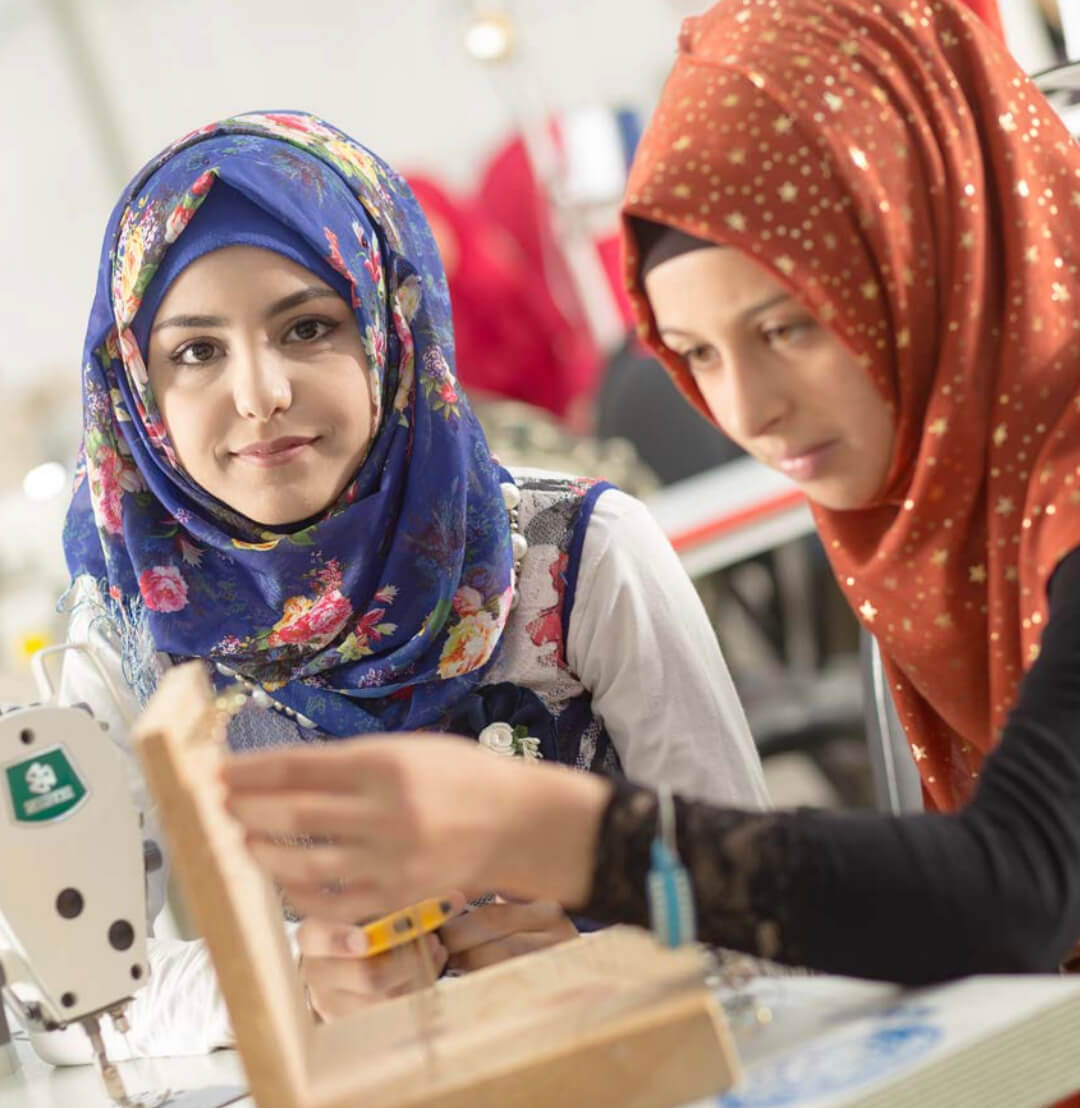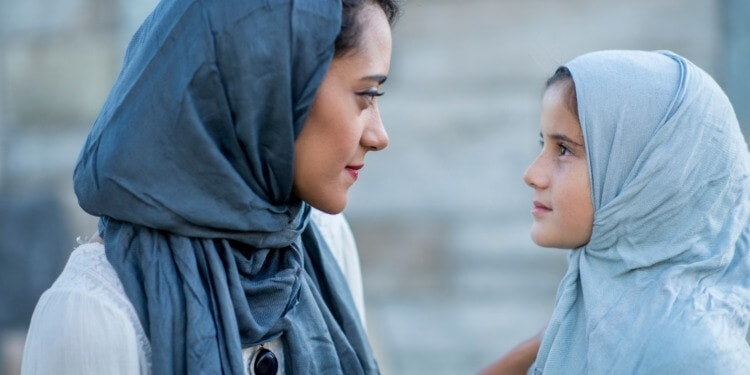Access to education for those who grow up in crisis can be a major challenge, hindering millions from having decent livelihoods, building a career, and properly integrating into their socio-economic life. According to the United Nations High Commissioner for Refugees (UNHCR), at the end of 2020 more than 82 million people were forcibly displaced because of persecution, conflict, violence, or human rights violations.
Effective educational interventions for adults is the ultimate tool for the inclusion of forcefully displaced families as a whole in the medium and long-term. Research by the British Council points out that educating adults yields a double advantage. With constructive education, displaced adults can enter the formal labour market and transit to financial independence. Moreover, more educated parents have, on average, better educated children.
Technical and vocational education and training (TVET) has been receiving growing recognition as a successful mechanism for realizing better employment conditions and achieving socio-economic status. Refugees and internally displaced people (IDPs) can particularly benefit from TVET programmes that target local industry needs and provide a tailored training to integrate those in vulnerable situations.
The work of the United Nations Industrial Development Organization (UNIDO)
TVET, entrepreneurship, and skills development for youth are necessities to stay afloat in times of instability. UNIDO has been working in several regions to help mitigate the impact of crises by creating economic opportunities for the affected populations. Skills development, job creation and livelihood opportunities are a crucial dimension to preserving stability in the countries that host refugees, and are priorities within the work of UNIDO.
In Turkey, for example, UNIDO implemented two skills development projects between 2015 and 2018. According to UNHCR, Turkey currently hosts more than 3.6 million Syrian refugees. Despite having their basic needs met, without productive means to occupy their time and improve livelihoods, refugees, especially vulnerable groups such as women and youth, can become socially unstable, less resilient, and lose hope for the future.
In that context, UNIDO offered vocational skills training for apparel manufacturing, focusing on sewing machine operating, pattern making, on-the-job training, and production management. Graduates of the training were able to design and produce garments, which increased their chances to enter the labour market.

“We started living in camps and times were difficult. This course was very important for its psychological and vocational contributions. Now we have hope for the future and we would like to thank all stakeholders of the project,” said Mecid Abdulkrem, a graduate of the vocational training.
More than 2,100 beneficiaries were trained in apparel manufacturing during the projects’ period, restoring the self-confidence of the refugees and increasing their integration into the Turkish society.
Related Articles: Investing in technical skills of young men and women for poverty alleviation | How Can Digital Skills Nurture Social Inclusion?
“By providing refugees and IDPs with demand-driven skills and a supportive community, technical and vocational training helps assure a smooth transition into the labour market, as well as a smooth integration into a new social and economic environment. UNIDO is committed to improving the livelihoods of such vulnerable groups by advancing skills development programmes,” commented Virpi Stucki, Chief at the Rural Entrepreneurship, Job Creation & Human Security Division at UNIDO.
In South Sudan, UNIDO and the government of Japan implemented a project to create employment and income opportunities for internally displaced people and their host communities by providing skills and entrepreneurship training, and by establishing the basic facilities for agro-processing. Since 2019 the project has trained 244 IDPs and members of host communities in entrepreneurship development, group savings and loans, as well as in the extraction of edible oil from sesame seeds and groundnuts, including the post-harvest handling of raw materials. Watch the video below for more information.
Refugee Inclusion & TVET: Recommendations for policymakers, funders, NGOs
A report prepared by the British Council examined the inclusion of refuges in TVET in five countries – Ethiopia, Jordan, Pakistan, South Africa and the UK – and elaborated recommendations to improve inclusivity of displaced persons in this type of education.
- Availability: for consideration by policymakers and funders. Where TVET systems are weakly established within an administration, consideration should be given to improving the state of the wider TVET system in the host country as well as the integration of refugees into that TVET system. In addition, governments of host countries should regularly update existing asylum and refugee policies to include education entitlement.
- Accessibility: for consideration by policymakers and funders. Where access to TVET is restricted by local institutions or officials in a way which is contrary to national policy, funders should seek to use whatever influence they have to bring attention to, and so help rectify this. Those involved in funding TVET should identify a single official, or point of contact, to gain an overview of the TVET profile of the country in which they are working, to seek to assess the relevance of the provision on offer to local employment patterns, and to promote and explain the distinctive nature of TVET.
- Acceptability: for consideration by education providers, funders, and NGOs. There should be research into the quality of non-state-funded TVET provision within those administrations with weak or no TVET systems. Policymakers and donor agencies should conduct more independent impact evaluations of TVET interventions for refugees. Funders should use impact assessments to determine which programmes are meeting objectives so that funding can be channeled to the most successful initiatives. Measures should be proposed to improve refugee access to the formal economy in the host country.
- Adaptability: for consideration of policymakers and donor agencies. Priority in funding should be given to projects which are longer-term and have the potential to be sustainable, rather than short-term, temporary schemes. Organisations concerned with improving refugees’ access to TVET should seek to collaborate with actors delivering other support services to develop more far-reaching and long-term solutions. Policymakers and funders should take measures to expand the provision of TVET within areas that host large concentrations of refugees, such as camps and villages.
Partnering with UNIDO and the Learning and Knowledge Development Facility
Interested in addressing the challenge? The Learning and Knowledge Development Facility (LKDF) is a platform by UNIDO that promotes industrial skills development among young people in emerging economies.
Working with the private sector through Public-Private Development Partnerships (PPDPs), the LKDF supports the establishment and upgrading of local industrial training academies to help meet the labour market’s increasing demand for skilled employees, ultimately contributing to inclusive and sustainable industrial development and social stability.
— —
Follow LKDF on Twitter and LinkedIn to be informed on PPDPs, skills development, sustainable industrial development, and more.
Editor’s Note: The opinions expressed here by Impakter.com columnists are their own, not those of Impakter.com. — Featured Photo: Woman and child, who participated in UNIDO’s vocational skills training, looking into each other eyes. Source: UNIDO.








